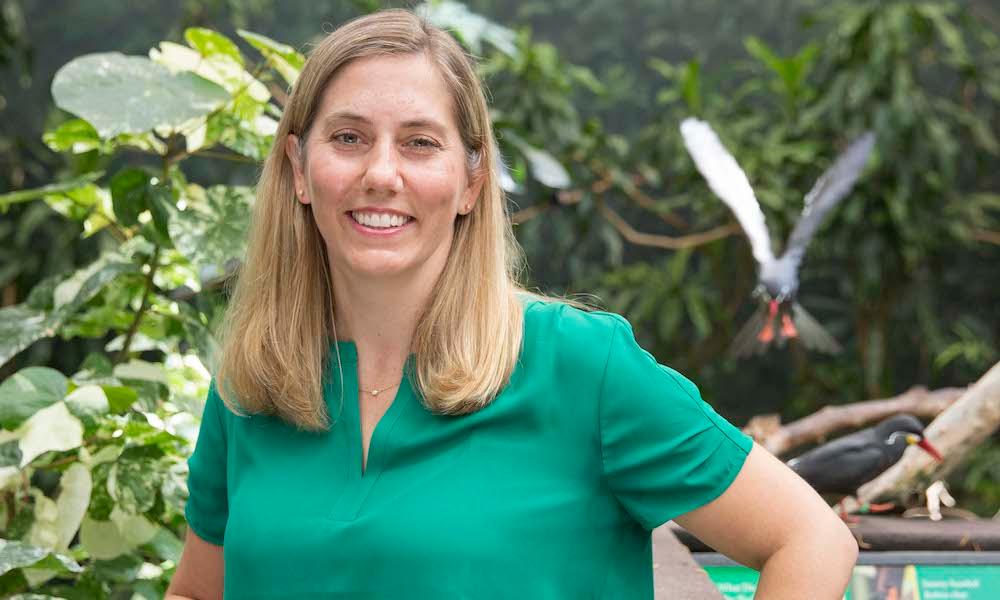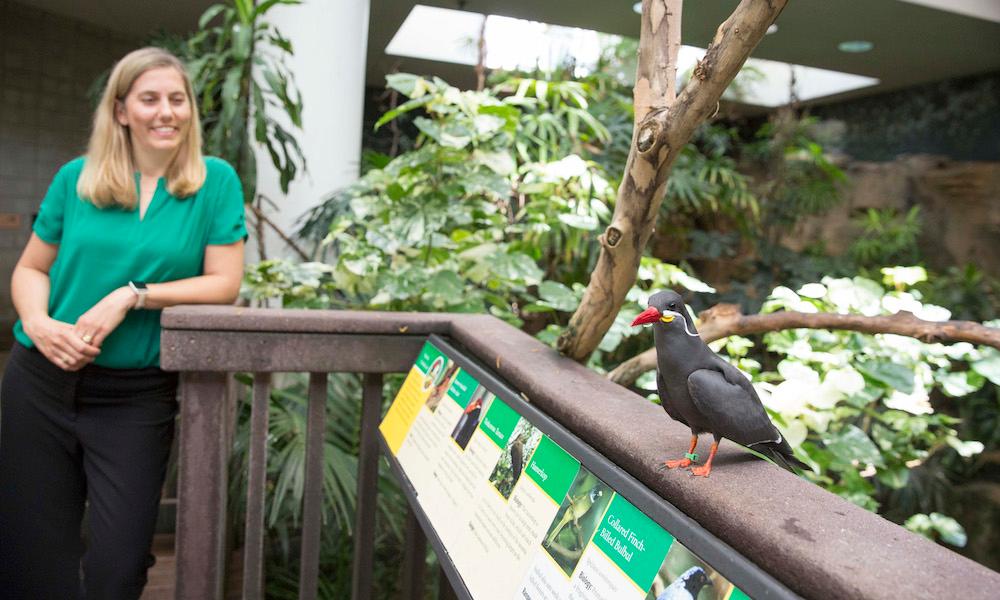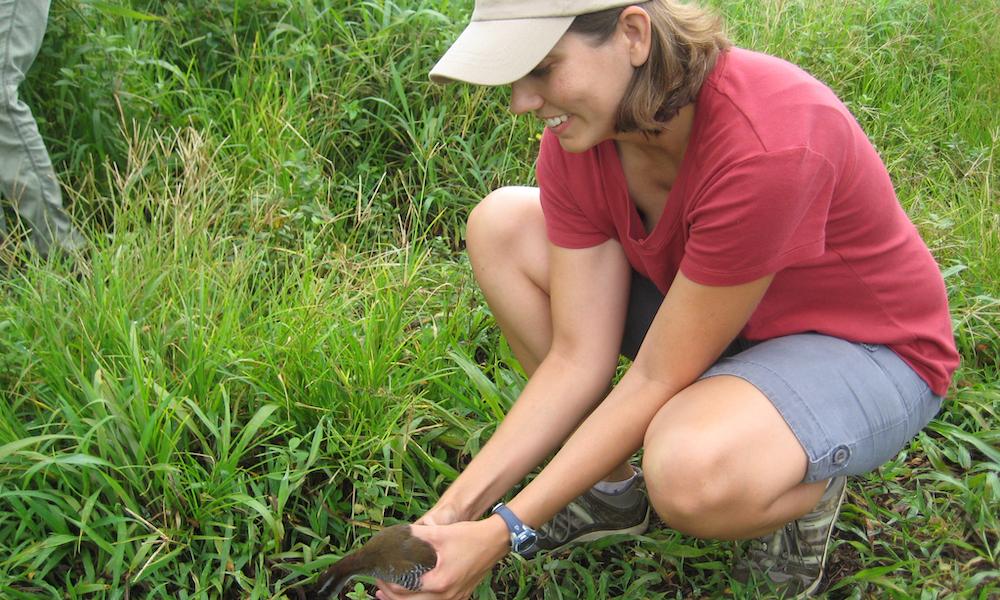Caring for the creatures
Megan Reinertsen Ross (’96) is first female director of Chicago’s Lincoln Park Zoo
Science and Technology
SUMMARY: Ross, who double majored in biology and psychology, credits her JMU professors and experiences with exposing her to studying animals as a profession and preparing her well for her increasing responsibilities at the zoo.
By Janet Smith (’81)
Ensuring the positive welfare of the 750 animals and countless fish and invertebrates representing 200 species at Lincoln Park Zoo in Chicago requires more than a love for wildlife. It calls for science-based care.
That’s where Megan Reinertsen Ross (’96), the eighth director of the 151-year-old free zoo—and the first female to fill the role—and her team come in.
“It’s our duty as scientists and people who care about wildlife to understand what the individual experience is for that particular animal so we can do what we can to make its life as fulfilling as possible,” said Ross, who began working at the zoo in 2000 and now oversees programmatic and strategic growth, as well as day-to-day operations.
Lincoln Park Zoo has one of the largest scientific staffs among U.S. zoos, with more than 40 full-time scientists at the 49-acre zoo, which is also a certified arboretum. Additional researchers evaluate learning programs and conduct audience research so zoo officials can understand how the facility’s 3.6 million annual guests receive information to become better advocates for quality wildlife care. “We use science all across the whole institution,” Ross said.
 |
| While completing her Ph.D., Ross applied to be the zoo's bird curator. There she completed her dissertation research, which focused on the effects of ultraviolet light on bird behavior. |
“Ambassador” animals—those that may engage with guests to help foster a connection with wildlifere—are no longer “handled,” Ross said. Instead, people are invited to join zoo staff members in feeding or grooming animals. “We let the animals have choice and control over whether or not they want to participate on any given day,” Ross said.
The zoo is also involved in collecting data in the wild and comparing it with zoo-collected information to see parallels in animal welfare. “We want to be as impactful as possible,” Ross said. “It’s not just providing care for animals that are here, but it’s also having that reflect back to what’s happening in the wild. It’s really gratifying.”
Ross, who double majored in biology and psychology, credits her JMU professors and experiences with exposing her to studying animals as a profession and preparing her well for her increasing responsibilities at the Lincoln Park Zoo.
“There was a 100% JMU influence on me,” said Ross, who was promoted to zoo director in 2018. “I knew I loved science, but I didn’t know what career opportunities there were besides those in the medical field before I got to JMU.”
Drawn to JMU’s pre-physical therapy program, the Atlanta native enrolled as a freshman biology major in 1992. She attended a biology department brown-bag lecture that featured psychology professor Suzanne Baker presenting her research on animal behavior in Southeast Asia. “I thought, ‘Oh, animal behavior, that’s a real thing.’”
 |
| At JMU, Ross took three biology classes with professor Charles Ziegenfus. "Zig really took the time to talk with me about how to do things appropriately and how to handle birds,” she said. |
That realization led to talking with, and later working in, Baker’s laboratory and taking ornithology classes (the study of birds) and fieldwork with now professor emeritus of mathematics and adjunct professor of biology Charles “Zig” Ziegenfus. “I realized that I had a real passion for birds and animal behavior,” Ross said. “So that’s where psychology came in and shaped what I wanted to do with my career.”
Baker, now assistant head of JMU’s psychology department, continues to support her former student as a member of Lincoln Park Zoo’s Institutional Animal Care and Use Committee.
Ziegenfus and his deep commitment to ornithology resonated with Ross, who took three of his biology classes: basic ornithology and basic and advanced ornithology field techniques.
She recalls rising at 3 a.m. to set up mist nets by dawn to catch, measure, band and release birds at sites near campus and on field trips to Slate Lick Lake and Mountain Lake Biological Station in Virginia, the Dolly Sods Wilderness Area in West Virginia and the Outer Banks of North Carolina.
“Zig really took the time to talk with me about how to do things appropriately and how to handle birds,” Ross said.
Ziegenfus recalls Ross’ eagerness to learn how to deal with birds in the wild. “Extracting birds from mist nets or traps is not an easy task. Her progress was slow but deliberate, and I could see her confidence build up over time.” He remembers her excitement when they safely caught and banded a northern saw-whet owl, a tiny bird that weighs about 3 ounces, at Dolly Sods—and the surprise of waking up the next morning to snow, ice and winds of 20 mph.
|
"I knew I loved science, but I didn’t know what career opportunities there were besides those in the medical field before I got to JMU." |
Ross recalled a field techniques trip to Slate Lick that left her in awe of her mentor’s focus and joy in spotting a bird known as an elusive species.
“Zig was recovering from a hip-replacement operation and I was to do the heavier work in the field,” Ross said. “We saw a brown bird in the net, and Zig got ahead of me, so excited that he threw down his cane and started running toward the net.” The bird was, as Ziegenfus suspected, a brown thrasher. “As a result, I have a very special place in my heart for brown thrashers.”
Birds led Ross’ migration to Lincoln Park Zoo. After graduating from JMU, she enrolled in Georgia Tech’s psychology program to study animal behavior. The graduate program’s laboratory was at Zoo Atlanta. When Ross was almost through her Ph.D. program of study, an official of Lincoln Park Zoo asked her to apply to be its bird curator. There she completed her dissertation research, which focused on the effects of ultraviolet light on bird behavior.
As zoo director, Ross shares a role once held by the late Marlin Perkins, who left Lincoln Park in 1962 to host Mutual of Omaha’s Wild Kingdom.While he was at the Chicago zoo, Perkins and zoo veterinarian Dr. Lester Fisher worked on a program called Zoo Parade. Fisher, who was Lincoln Park Zoo’s director for 30 years, still comes by to check on the operation, Ross said.
“I’m very proud to be only the eighth director of Lincoln Park Zoo,” Ross said. “I’m super proud of being the first female director because I feel like it is important to show women in all sorts of different roles. I love the idea that women and young girls now see that there are lots of women in science.”

